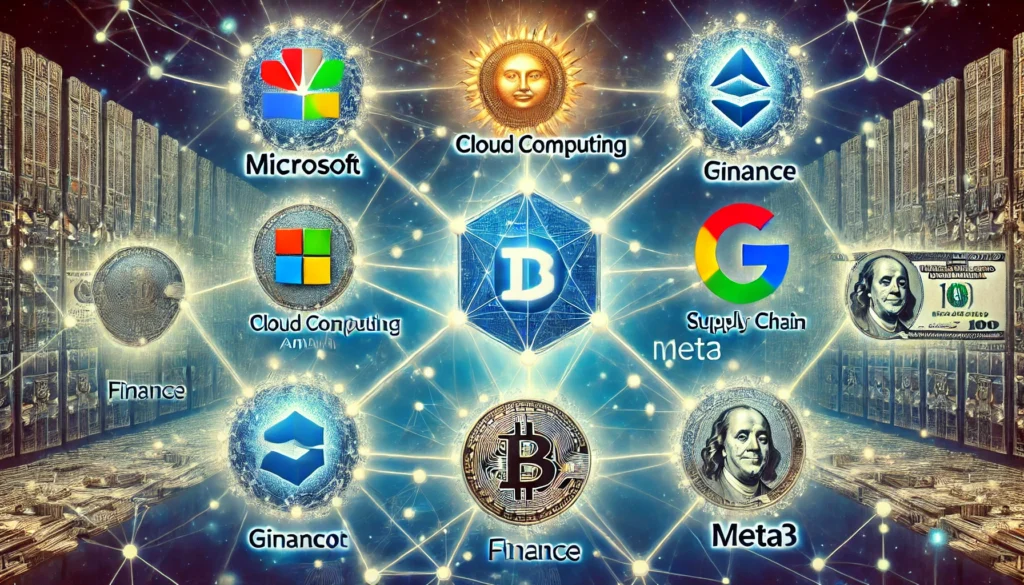
Introduction
Blockchain technology has moved beyond its origins as the backbone of cryptocurrencies like Bitcoin and Ethereum. Today, U.S. tech giants such as Microsoft, Google, Amazon, and Meta are heavily investing in blockchain to revolutionize industries ranging from finance to supply chain management. This article explores why these companies are betting big on blockchain, the key applications they’re pursuing, and the potential impact on the future of technology and business.
The Allure of Blockchain Technology
Blockchain’s core features make it highly appealing to tech giants looking to innovate:
- Decentralization: Eliminates the need for intermediaries, reducing costs and inefficiencies.
- Transparency: Provides an immutable ledger, ensuring trust and accountability.
- Security: Employs cryptographic methods to secure data and prevent unauthorized access.
- Scalability: Emerging blockchain solutions like Layer 2 networks offer faster and more scalable systems for enterprise use.
Key Use Cases for Blockchain
1. Cloud Computing and Data Security
Tech giants are integrating blockchain into their cloud services to enhance security and transparency:
- Microsoft Azure: Offers blockchain-as-a-service (BaaS) solutions, enabling businesses to build and deploy blockchain networks.
- Google Cloud: Partners with blockchain companies to integrate decentralized applications (dApps) and offer enhanced security for cloud services.
2. Supply Chain Management
Blockchain’s ability to provide end-to-end visibility in supply chains is a game-changer:
- Amazon Web Services (AWS): Uses blockchain to track goods from production to delivery, ensuring authenticity and reducing fraud.
- IBM: Collaborates with Walmart to enhance food traceability using Hyperledger Fabric, a blockchain framework.
3. Financial Services
Tech giants are leveraging blockchain to disrupt traditional finance:
- Meta (formerly Facebook): Launched Novi, a blockchain-based digital wallet, and explored Diem (formerly Libra), a digital currency.
- Google Pay: Investigates blockchain integration for faster and cheaper cross-border payments.
4. Web3 and Decentralized Applications (dApps)
Blockchain underpins Web3, the next generation of the internet, characterized by decentralization and user empowerment:
- Meta: Invests in Web3 infrastructure to create decentralized social networks.
- Microsoft: Supports decentralized identity solutions to give users control over their data.
Why Tech Giants Are Embracing Blockchain
Competitive Advantage
Blockchain provides a strategic edge in a rapidly evolving digital landscape. Companies adopting blockchain can offer more efficient, secure, and transparent solutions, differentiating themselves from competitors.
New Revenue Streams
Blockchain opens avenues for new business models, such as:
- Tokenization of assets.
- Subscription-based blockchain services.
- Smart contract automation.
Addressing Consumer Demands
With growing concerns over data privacy and security, blockchain offers a solution that aligns with consumer expectations for transparency and control.
Challenges in Blockchain Adoption
Despite its potential, blockchain adoption faces several hurdles:
- Scalability: Current blockchain networks struggle to handle high transaction volumes, though solutions like Ethereum 2.0 aim to address this.
- Regulatory Uncertainty: Governments worldwide are still formulating policies for blockchain and cryptocurrencies.
- High Costs: Implementing blockchain infrastructure can be expensive for enterprises.
- Interoperability: Ensuring different blockchain systems work seamlessly together remains a challenge.
Future Implications
Transforming Industries
Blockchain’s applications extend beyond finance and technology. Industries like healthcare, real estate, and entertainment are exploring its potential for:
- Secure patient records.
- Transparent property transactions.
- Digital rights management.
Shaping the Internet’s Future
Web3, powered by blockchain, promises to decentralize the internet, shifting control from centralized corporations to individual users. This evolution could redefine how data is stored, accessed, and monetized.
Driving Global Innovation
As U.S. tech giants lead blockchain adoption, their investments could accelerate technological advancements worldwide, fostering innovation in both developed and emerging markets.
Comparative Analysis: Blockchain Adoption Among Tech Giants
| Company | Key Blockchain Initiative | Target Industry |
|---|---|---|
| Microsoft | Azure BaaS | Cloud Computing |
| Blockchain partnerships for dApps | Web3 and Payments | |
| Amazon | AWS Blockchain for supply chains | Logistics and E-commerce |
| Meta | Novi and Web3 infrastructure | Social Media and Finance |
| IBM | Food traceability with Hyperledger | Supply Chain |
Conclusion
U.S. tech giants are betting big on blockchain technology to drive innovation, create new revenue streams, and address evolving consumer demands. By investing in applications across industries such as finance, supply chain, and Web3, these companies are shaping the future of technology and business. While challenges like scalability and regulatory uncertainty remain, the potential of blockchain to transform industries and empower users ensures its central role in the digital economy of tomorrow.
Relevant Resources
- Microsoft Azure Blockchain: Explore Microsoft’s blockchain solutions.
- Google Cloud Blockchain: Updates on Google’s blockchain initiatives.
- AWS Blockchain: Amazon’s blockchain services for enterprises.
- Meta Web3 Projects: Insights into Meta’s Web3 developments.